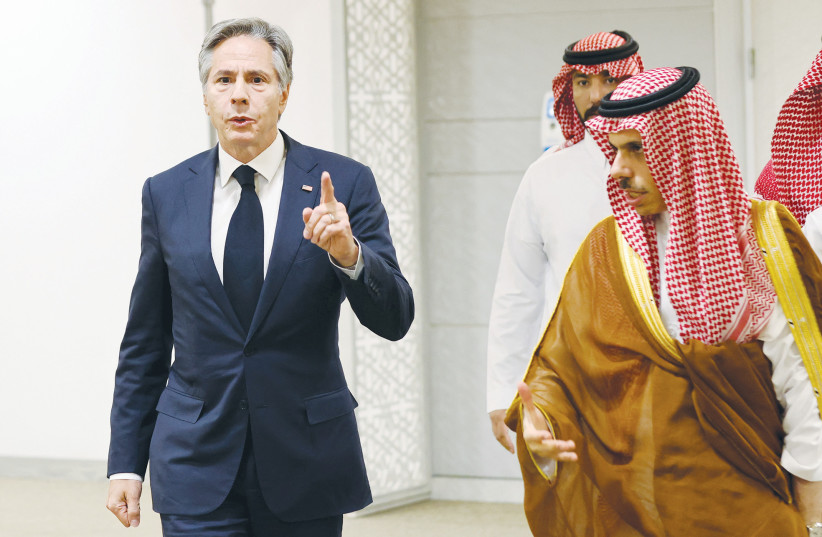Strategic Affairs Minister Ron Dermer didn’t dismiss outright the possibility of Israeli support for a Saudi Arabian civilian nuclear power program that includes uranium enrichment during an interview he gave to PBS over the weekend.
“Like so many things, the devil is in the details,” he told NewsHour on Friday after holding meetings in Washington last week with US officials, including with Secretary of State Antony Blinken on Friday.
They discussed the US push for a deal with Saudi Arabia, which could involve both Saudi nuclear civil power, including enrichment, as well as normalized ties with Israel.
“We will have to look at what is ultimately agreed on,” Dermer said.
“The Saudis have put that, a civilian nuclear program, which you probably are aware of, as signatories of the Nuclear Non-Proliferation Treaty (NPT), they [the Saudis] could go to China or France tomorrow and they could ask them to set a civil nuclear program and to allow for domestic enrichment,” Dermer said.

“The question I ask myself is, if the US is involved in this, what will that mean 10 or 20 years down the road,” he said.
Better the devil you know
Dermer clarified that Israel would not agree to any Saudi nuclear weapons program. The question is what are the safeguards and what happens if Riyadh turns to China instead, he told PBS.
NewsHour reminded him that there are those, like former national security adviser Meir Ben-Shabbat, who has warned that Saudi Arabia joining the nuclear club would lead to nuclear proliferation.
Dermer said that one also has to consider that a Saudi-Israeli normalization deal would be a game-changer for the region and lead to other normalization deals with Arab states.
Saudi Arabia believes that this move would anchor its relationship with the US for the next half-century, Dermer said.
He would not speculate as to what gestures Israel would have to make in exchange for a Saudi normalization deal.
“We would like to achieve a peace agreement with our Palestinian neighbors,” he said.
Israel and the US both have an interest “in seeing if we can [put] the Palestinians on a path that would ultimately lead to a settlement of the conflict,” Dermer said.
The State Department said that during Blinken’s meeting with Dermer on Thursday, he reaffirmed the United States’ enduring friendship and steadfast commitment to Israel’s security.”
Blinken and Dermer “discussed ongoing efforts to further Israel’s full integration into the Middle East,” the State Department said in a nod to the Saudi issue.
Blinken also spoke by phone on Thursday with Saudi Foreign Minister Prince Faisal bin Farhan “to discuss a range of bilateral and regional issues,” the State Department said.
During Blinken’s conversation with Dermer, he also discussed the threats posed by Iran and its regional proxies, including in Lebanon.
They met as Israel is concerned that the US would accept an agreement with Tehran that would allow it to maintain nuclear capacity. Israel is particularly concerned by the deal brokered earlier this month for the release of five Iranian hostages in exchange for the release of $6 billion in Iranian funds from a South Korean bank.
The State Department also underscored that in Blinken’s conversation with Dermer the issue of the Israeli-Palestinian conflict was also raised.
“The secretary emphasized the importance of Israel and the Palestinians taking affirmative steps to de-escalate tensions and bolster stability in the West Bank,” the State Department said.
Israel is under pressure from the US to halt settlement activity and to provide the Palestinian Authority with economic gestures.
US State Department Deputy spokesman Vadant Patel separately told reporters in Washington that the US was concerned by Israel’s advancement of the legalization of West Bank outposts.
“We strongly oppose the advancements of settlements and urge Israel to refrain from this activity, including the promotion of outposts,” Patel said. “We take this issue very seriously, and it impinges on the viability of a two-state solution.”
Left-wing group Peace Now on Thursday said Israel was planning to invest NIS 700 million in settler activity, of which NIS 27.6m. was earmarked to help legalize outposts.
On Sunday, the government is slated to take steps to advance the development of two fledgling settlements, Amichai and Mevo’ot Yeriho.
It plans to tap the World Zionist Organization’s Settlement Division with the power to develop the land, particularly with respect to production and agriculture.
The move is a technical one, given that the WZO’s Settlement Division is the government’s partner in developing settlements.
The communities themselves have already been authorized as settlements. The government created the Amichai settlement in the Binyamin region in 2017 and Mevo’ot Yeriho in 2019.
